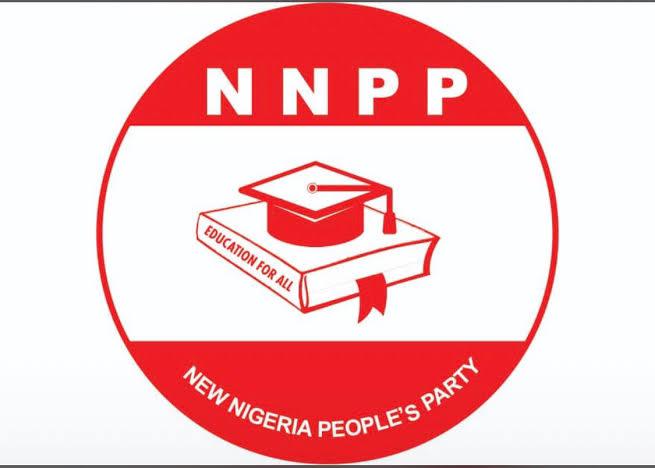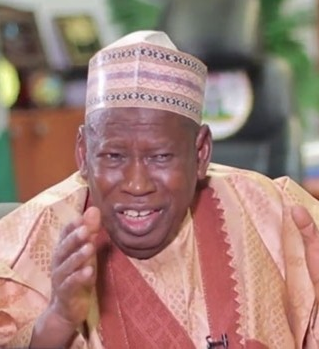The national chairman of the ruling All Progressives Congress (APC), Abdullahi Umar Ganduje, has come under fire over his remarks suggesting the party is not opposed to Nigeria becoming a one-party state.
Ganduje had, in an interview with State House correspondents after meeting with President Bola Ahmed Tinubu on Friday, insisted the APC was not actively pursuing a one-party system.
He, however, added that if Nigerians gravitated en masse to the ruling party, “we cannot quarrel with that.”
“Leaders worried about a one-party state have no need to fear. A one-party state is not by force; it is by negotiation. It is by other political parties seeing the effect of the positive governance of our party. If they decide to come to our party willingly, I think there is nothing wrong with that,” he said.
He had also claimed that a multi-party system spoils governance, saying, “Today, China is one of the strongest countries in the world and is a one-party system. We are not saying we are working for a one-party system, but if this is the wish of Nigerians, we cannot quarrel with that.
“You know they say too many cooks spoil the soup; too many political parties spoil governance,” Ganduje said.
Ganduje’s remarks came amid the wave of defections to the APC, including those of Senators Adamu Aliero (Kebbi Central), Yahaya Abdullahi (Kebbi North) and Garba Maidoki (Kebbi South) who joined the party after meeting with President Tinubu on Friday.
The opposition has been further depleted in recent weeks with the defections of Delta State Governor Sheriff Oborevwori, former governor and 2023 PDP vice-presidential candidate Ifeanyi Okowa as well as other state officials and lawmakers to the APC.
Several National Assembly members have also defected, fuelling concerns that the APC-led government may be orchestrating a gradual slide to a one-party state.
Last week, former President Goodluck Jonathan spoke against it, warning that any move to establish a one-party state through political manipulation to serve individual ambitions would be detrimental to the country.
Although the presidency and the APC leadership have denied any intention to pursue a one-party agenda, Ganduje’s latest comments have re-ignited speculation that state resources might be quietly deployed to undermine the opposition.
In separate interviews with Daily Trust yesterday, opposition parties, civil society groups and pro-democracy advocates condemned Ganduje’s remarks, warning against attempts to stifle political plurality.
It’s disregard for democratic principles – NNPP

In Kano, where Ganduje served as governor for eight years, the state chairman of the ruling New Nigeria People’s Party (NNPP), Hashim Sulaiman Dungurawa, said the comments reflected a disregard for democratic principles.
“I was not surprised by Ganduje’s thoughts on a one-party system, because it shows a lack of commitment to democratic ideals. A true democrat believes in participation, diversity of opinion, and the value of opposition,” he said.
“When someone in a position of power, disregards other parties or voices, it raises serious concerns. Democracy is about openness, inclusion, and respecting the legitimacy of diverse political actors. Being in another party doesn’t make one irrelevant—it enriches democratic discourse.
“When someone starts believing that only one party should exist, or that only their views matter, it becomes a problem. No country develops without a viable opposition. The democracies we admire—like Britain and the United States—do not operate one-party systems.”
Dungurawa urged Ganduje to retract his statement, saying it could sow unnecessary division.
He added: “Leadership requires respect for the fact that power ultimately comes from the people. One day, someone else will hold the positions we do today. That’s the essence of democracy. I sincerely urge him to withdraw the statement, as I believe most Nigerians are uncomfortable with such remarks.”
It’s an indicator of power intoxication – CHRICED
Also speaking on the matter, the Executive Director of the Resource Centre for Human Rights and Civic Education (CHRICED), Dr Ibrahim Zikirullahi, said the statement by the APC chairman after meeting the president sent a dangerous signal for Nigeria’s democracy and might hint at a hidden agenda for the 2027 elections.
 “For a party that was in the opposition for almost 16 years to begin to contemplate the idea of a one-party state is not only undemocratic but a symptom of political short-sightedness and a clear indicator of power intoxication,” Zikirullahi said.
“For a party that was in the opposition for almost 16 years to begin to contemplate the idea of a one-party state is not only undemocratic but a symptom of political short-sightedness and a clear indicator of power intoxication,” Zikirullahi said.
“If the PDP, which controlled the federal government from 1999 to 2015, had pursued a one-party state agenda, we wouldn’t be talking about an APC-led federal government today. It is unthinkable and politically irresponsible for anyone to be tinkering with that idea,” he said.
He warned that any attempt to implement such a plan would be met with fierce resistance from civil society:
“Tinubu, Ganduje and their co-travelers should forget about it. Any such attempt will be fought against by the civil society movement with the last drop of our blood.”
It’s recipe for dictatorship – Fagge
Also in Kano, a renowned political analyst, Professor
, warned that either a legal one-party system or a dominant-party system poses significant dangers for Nigeria’s democracy.
“There is the system where only one political party is legally recognised, with others banned. That was the case in Tanzania and in many former socialist states. Then there is the dominant-party system, where other parties exist, but one party is so powerful that the rest are virtually irrelevant,” he explained.
“In Nigeria, which practices liberal democracy, either scenario is unhealthy.
“It denies people real electoral choices. Voters would not be electing between genuinely competing alternatives, but merely selecting among candidates approved by a single party. That is a recipe for dictatorship. We’ve seen how this plays out in countries like Cameroon and Uganda, where entrenched ruling parties have weakened democratic checks,” he said.
Fagge added that the erosion of opposition often leads to political instability. “In Nigeria’s Second Republic, efforts by the ruling NPN to absorb opposition states created tensions that contributed to the collapse of democratic rule and justified military intervention.”
He further warned of declining public confidence in the electoral process.
“When people feel they have no genuine choice in leadership, two forms of protest can emerge. One is silent — voter apathy. People stay away from the polls because they no longer trust the electoral system. This opens the door to electoral malpractice and undermines the legitimacy of elections.
“The second kind is open protest — when frustrated citizens take to the streets. That can lead to chaos, violence, and further destabilisation. Either outcome is dangerous,” Fagge stated.
According to him, whether by law or de facto dominance, one-party rule in any form is undemocratic and a threat to Nigeria’s political stability.

Nigeria too complex for one-party rule – Ohanaeze, Afenifere
The national publicity secretary of the Ohanaeze Ndigbo, Ezechi Chukwu, also rejected any move towards a one-party system, saying it would be contrary to the spirit and letter of the constitution.
“One-party state or mono-party democracy is not healthy for our contemporary polity. The constitution of Nigeria as it is today does not provide for a one-party state. It provides for a multi-party democracy,” he said.
“It is obvious that the framers of our constitution must have considered the pluralistic characteristics of our country and our desires as a people, which is the rationale for the multi-party system enshrined in our constitution.

“Consequently, anything that is perpetrated or institutionalised to undermine the multifaceted political nature of our constitution is not healthy for our democracy.”
Chukwu added that the lack of strong opposition stems from weak institutions. “There is no serious opposition because we do not have strong, robust, and independent institutions. If we had institutions that were de-personalised and not at the mercy of any government in power, our multi-party democracy would thrive.”
He urged political leaders to strengthen democratic structures. “Our political leaders have a moral burden to create an enabling environment for our democracy to excel. Anything to the contrary will jeopardise the foundations on which our political life is anchored.”
He also criticised the ongoing wave of defections, saying they were driven by political survival rather than ideology. “People are defecting because they want to survive politically, not because of values and principles. We need men of conscience to drive our political locomotive and institutions.”
Similarly, the spokesman of Afenifere, Prince Justice Faloye, said a one-party system contradicts democratic norms and warned against replicating the APC’s dominance in Lagos on a national scale.
He stated: “One-party state is not democratic, and this is a democratic dispensation. We know that’s where they are heading—with defections, intimidating governors to cross over.
“It is what happens in Lagos which has effectively been a one-party state for 12 years. But Nigerians will resist it.”
He warned that growing authoritarianism could provoke national unrest, saying “We’ve seen it. With INEC in his pocket, police in his pocket, judiciary in his pocket—democracy is dead. If peaceful change becomes impossible, violent change becomes inevitable.”
According to Faloye, performance, not coercion, should determine electoral success.
“If you do a very good job, people will vote for you. PDP thought they would rule for 60 years—but when they lost, they stepped aside. If Tinubu loses, we expect the same. No one-party state has ever avoided eventual revolt,” he said.
It’s a sign of authoritarianism – Yiaga Africa
Samson Itodo, Executive Director of Yiaga Africa, said the clamour for a one-party state is a warning sign of authoritarianism creeping into Nigeria’s political system.
“This desire to control every institution of government is what breeds authoritarianism. It limits political pluralism and weakens accountability,” he said. “We have not built strong political parties; what we have are individuals desperate for power. That is why they want to eliminate competition.”
Itodo argued that political competition is vital for democracy.
He said, “When you take competition out of democracy, it loses its vitality. Even weak opposition is better than no opposition. Multi-partism is essential for checks and balances.
“It is not even good for the ruling party. If those before them had shut the system down, there would be no APC government today. Tinubu and the APC should jettison the idea. It will not happen.”
It will breed tyranny – LP
The Labour Party (LP) also weighed in through its national publicity secretary, Obiorah Ifoh, who said the idea of a one-party system is undemocratic and breeds tyranny.
“Nigerians will not be pushed into that system. Many parties are in crisis because their leaders refuse to respect party supremacy. This gives political officeholders cover to defect to the ruling party for relevance and protection,” he said.
Ifoh criticised governors who undermine their parties, asking “Is it not absurd that a governor from an opposition party cannot critique the ruling party? Or that another is already campaigning for the president against his own party, barely two years into his term?”
He said self-interest has overtaken principle in Nigerian politics. “The political class is so selfish that survival comes first—even if it means betraying the party that brought them to office. But Nigerians will not accept a one-party state. In 2027, they will speak with their votes—if those votes are allowed to count.”
(Daily Trust)


